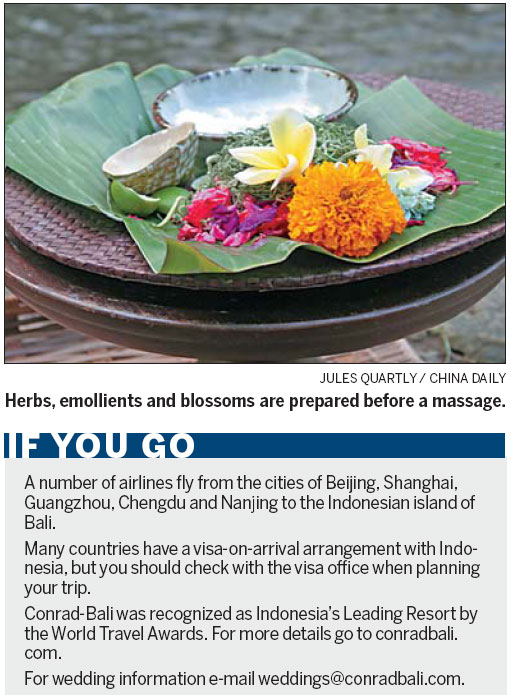Eat, pray, massage

Someone well aware of the increasing power of the yuan is general manager of the award-winning Conrad-Bali, Jean-Sebastien Kling. Formerly GM at the Hilton in Maldives, he witnessed a surge of 24 percent in the number of Chinese visitors during the five years he was there.
"Many came to celebrate their weddings and returned with beautiful pictures that they showed off to their friends, who then wanted to come. The same is happening here," Kling comments.
"Chinese are very much into brands. So they want to buy into a branded experience, which is essentially what we provide. They are certainly discerning and it is our job to make them feel special."
Related: Diary of a spa virgin
The urbane Frenchman points to the hotel's iconic Infinity Chapel wedding venue, a pyramid-shaped structure that appears to float over the cerulean sea and into the cloudless sky.
He says it's his job to make the Conrad-Bali even more attractive to his Chinese guests by providing Mandarin-speaking assistants, menus in Chinese and generally cater to their needs.
"They don't just want sea, sand and luxury," he says, gesturing at the hotel's 7 hectares of carefully tended gardens, lagoons and buildings. "They are also after culture and history, which Bali is famous for."
As such the hotel is offering "Connect with Bali, Reconnect with Yourself", a series of personalized tours that introduce the island's amazing heritage, unspoiled beauty and spiritual heart.
For me, the outing was a test to see whether "progress" had stripped the island of its charms. And while rush hour traffic and roadside views were overwhelming, the years just peeled away when we eventually arrived at Pura Taman Ayun in Mengwi village, which has the atmosphere of an exotic English garden and is a UNESCO-listed heritage site dating back to 1634.
We then traveled onto Ubud, which despite its popularity, retains its charm - as the film Eat, Pray, Love somewhat saccharinely attests.
We had a wonderful meal in a ravine at Bridges wine bar, a fusion of "world meets" Asian cuisine. After which, the afternoon was spent at one of Ubud's famed art galleries; and by the side of a river, shaded by canvas tents, attended by masseuses from the Conrad-Bali's Jiwa Spa, refreshed by white wine and native dances.
My old Bali adventures seemed primitive by comparison. It was like a fantasy, really, but that is what Bali offers.
Agung Rai, founder of the Arma Museum and Resort, is an Ubud local who has clearly reaped the benefits of a tourism boom, since it first attracted the Bohemian set in the 1930s, after a Balinese art exposition in Paris.
The former farmer originally sold pictures on the beach to tourists to fund construction of his resort, and recalls seeing Mick Jagger playing soccer in the village when he visited for his Hindu wedding to Jerry Hall, in 1990.
He says Bali has always been a melting pot of peoples and ideas and points to the mask of a Taoist god as evidence of Chinese influence, which stretches back to before Hinduism held sway over the island.
Like others I spoke to, Rai says sustainable development is a must, otherwise tourism could spoil the fruits of success.
"It's important to find a balance between materialism and spiritualism, tradition and innovation."
So, while an airport extension is being built, along with a toll road to deal with a reported 200,000 extra cars on the road a year; the positives are ordinances preventing buildings taller than temples or palm trees, a partial 2010 moratorium on construction in the crowded south of the island, and the relatively untapped, pristine beauty of north Bali.
On a final note, my grandfather, a merchant seaman, visited Bali about 75 years ago and often said he left behind part of his heart there. I would add this is just as true today as it was then.
Contact the writer at julesquartly@chinadaily.com.cn.














